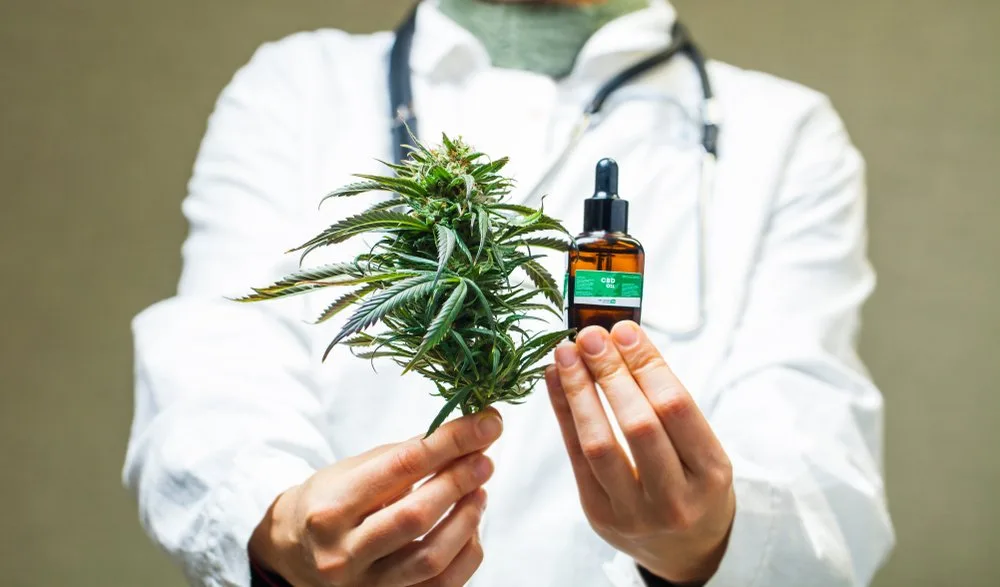Chronic pain affects more than 1 in 5 American adults. The condition can be debilitating to one’s life. It can increase the risk of depression, social isolation, anxiety, and poor sleep. Additionally, a 2018 study found that one in 10 people who commit suicide had signs of chronic pain.
To manage their chronic pain, sufferers have turned to opioids. Currently, the U.S. population consumes over 80% of the world’s opioids. Unfortunately, this behavior has grown into opioid dependence, creating a health crisis.
Now, not only are we faced with a chronic pain crisis, but we also have to deal with the nation’s dependence on painkillers. Yet, it appears that a solution to both of these crises may exist in medical marijuana.
What Is The Opioid Crisis?
In October 2017, then-President Donald Trump declared the opioid crisis a “public health emergency”.
Opioids work by attaching themselves to nerve cells in various parts of the body. The opioids then block the pain messages through the spinal cord from the body to the brain. Unfortunately, while opioids help to manage pain, they’re quite addictive, which can create a dependency crisis.
Opioid dependence increases the risk of heart disease, kidney damage, and lung infections.
According to statistics, over 100,00 people died of a drug overdose in the 12-month period ending March 2022. These stats prove that the need to manage pain has become a serious health crisis.
Can Cannabis Replace Opioids?
In recent years, medicinal marijuana has been at the forefront of many studies. Researchers continue to examine how the plant may improve our health and longevity.

K-State Research and Extension/Flickr
There have been studies highlighting cannabis’s potential as a pain management solution. Studies also show that cannabis may be a possible replacement for opioid use:
- A 2020 study focused on patients who were reliant on opioids to manage chronic pain for a decade. 31% of the patients were able to reduce opioid use, thanks to cannabis interventions. Also, 48% of them believed that cannabis helped them mitigate their opioid intake.
- A 2021 study found that over half of the study’s participants believed medicinal cannabis was more effective than prescription drugs. 85.5% of them shared that the side effects associated with prescription drug use were much worse compared to medicinal cannabis.
- Last year, a study featured 2000 patients. Patients reported that the use of medical cannabis resulted in less pain and improved functioning. The majority of patients using medical marijuana either stopped or reduced their use of pain medications.
- A study published earlier this year focused on sufferers of chronic pain using cannabis to manage their condition. They reported that their cannabis habits reduced their use of prescription opioids, prescription non-opioid, and over-the-counter pain medications. Also, less than 1% reported that the use of cannabis increased their use of these medications.
So, can marijuana replace opioids?
If so, there are a few hurdles that need to be addressed first.
For one, unlike opioids, marijuana isn’t legal in every state, and even in the states where it is, there are still plenty of conditions attached to it.
Additionally, cannabis comes in various forms. Researchers aren’t completely sure which species can help, and which ones can harm the body.
Nonetheless, the findings, if minimal, are promising, and it won’t be long before more and more health professionals begin to advocate for the use of marijuana for chronic pain.
How else can I manage chronic pain?
Not every chronic pain sufferer wants to use marijuana to manage their condition. But, that doesn’t mean that they want to continue to be reliant on opioids.
The following therapies can be effective amongst chronic pain sufferers:
- Deep breathing exercises
- Meditation
- Acupuncture
- Yoga
- Stretching
- Plant-based diets
Bottom line
Chronic pain is a condition that affects 20% of the American population. Opioids do provide a solution to managing the condition, but their use has created a health crisis of its own.
Research indicates that cannabis may provide a solution to both of these issues. Granted, larger studies still need to confirm this theory, but medicinal cannabis could be the answer to all our painful problems.
References
Bicket, M. C., Stone, E. M., & McGinty, E. E. (2023). Use of Cannabis and Other Pain Treatments Among Adults With Chronic Pain in US States With Medical Cannabis Programs. JAMA network open, 6(1), e2249797. https://doi.org/10.1001/jamanetworkopen.2022.49797
Pritchett, C. E., Flynn, H., Wang, Y., & Polston, J. E. (2022). Medical Cannabis Patients Report Improvements in Health Functioning and Reductions in Opiate Use. Substance use & misuse, 57(13), 1883–1892. https://doi.org/10.1080/10826084.2022.2107673
Kvamme, S.L., Pedersen, M.M., Rømer Thomsen, K. et al. Exploring the use of cannabis as a substitute for prescription drugs in a convenience sample. Harm Reduct J 18, 72 (2021). https://doi.org/10.1186/s12954-021-00520-5
Takakuwa, K. M., Hergenrather, J. Y., Shofer, F. S., & Schears, R. M. (2020). The Impact of Medical Cannabis on Intermittent and Chronic Opioid Users with Back Pain: How Cannabis Diminished Prescription Opioid Usage. Cannabis and cannabinoid research, 5(3), 263–270. https://doi.org/10.1089/can.2019.0039
Yong, R. J., Mullins, P. M., & Bhattacharyya, N. (2022). Prevalence of chronic pain among adults in the United States. Pain, 163(2), e328–e332. https://doi.org/10.1097/j.pain.0000000000002291





![women [longevity live]](https://longevitylive.com/wp-content/uploads/2020/01/photo-of-women-walking-down-the-street-1116984-100x100.jpg)









